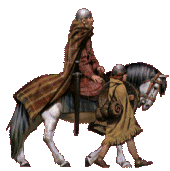*********************************************************
BIOGRAPHIE DE COMMIOS
*********************************************************
Commios, issu d'une famille noble d'Atrébatie (connue maintenant sous le nom d'Artois, capitale Arras), s'est d'abord distingué à la bataille de la Sabis avant d'être nommé roi par César qui voulait un allié sùr (!) dans la Gaule Belgique et qui désirait le retour de la royauté, garantie d'une stabilité politique qui n'avait plus cours en Gaule à cette époque. César voulait ainsi préparer un débarquement dans l'actuelle Grande-Bretagne. Il y envoya Commios comme ambassadeur, des Atrébates se trouvant aussi dans le sud de l'Angleterre, mais celui-ci est, selon ses dires, fait prisonnier. On ne sait pas trop ce que signifie cet évènement ; Commios préparait-il quelque chose ? Toujours est-il que César échouera par deux fois (autour de 55 avJC) à s'établir en Grande Bretagne. C'est pendant ces campagnes militaires que Commios rencontre les futurs chefs de la rebellion en Gaule. D'abord opposé à Vercingétorix, préférant la diplomatie, il finira par vouloir le rejoindre mais un attentat fomenté par l'un des lieutenants de César (Titus Labienus) l'en empécha, un dénommé Volusenius le blessa gravement au visage et il échappa de peu à la mort.
A Alésia, en 52avJC, il commanda l'une des 4 armées de secours. Devant cette défaite qui ne laissait plus aucun espoir, il est d'abord obligé de fuir en Germanie (A-t-il été conclure une paix avec les Germains?) mais revient rapidement, préférant continuer la rebellion dans son pays en créant avec le Bellovaque Corréos une insurrection quasi totale de la Gaule Belgique. Le pays est à feu et à sang et les romains sont à deux doigts d'être battus lorsque Corréos, trahi, est défait. Commios arrive trop tard pour le sauver mais se venge de sa blessure et atteint gravement Volusienus. Poursuivit par César, il parvient à emmener ses soldats en Angleterre par une ruse qui restera dans les annales. C'est en Angleterre qu'il fondera un nouveau royaume, créera une nouvelle ville, Calleva (Silchester). Ses fils lui succéderont jusqu'à ce que les Catuvelloni parviennent à s'emparer du territoire et que Claudius, en 42 après JC, le conquiert à son tour.
*********************************************************
COMMIOS's BIOGRAPHY
*********************************************************
Commios, nobleman of the Atrebates (Belgium Gallic Tribe, settled around Nemetocenna now Arras, North of France) distinguished himself in the battle of Sabis before being named King of the Atrebates and the Morinii by Caesar who wanted a sure ally (!) in the North of Belgium : he could so prepare the conquest of Brittany. He sends Commios as ambassador (Atrebates was settled in this country) but Commios will be arrested (it is what he claims).
Caesar will land twice in Brittany (around 55BC) without military success. Commios will follow him in his campaign and meet futur chiefs of the rebellion against Romans.
Then it will be the call of Vercingetorix : Commios wants to join him but he will be a victim of an attack, he escapes from few to the death and will swear to never be in the presence of a Roman !
He will be in Alésia (52BC) and will command one of the four armies who try to help Vercingetorix. We know the continuation : Siege, Gallic defeat, surrender of Vercingetorix.
Commios first escape in Germany and restarts in the North where it leads the guerrilla warfare against Romans. He finally hurts the one who had infringed in his life (Caius Volusenus Quadratus).
With Correos, king of the Bellovaques, he will persuade others Belgian tribes to resist again but it will be a new failure and Correos will die in the warfield. Pursued by Caius Julius Caesar, he decided, to save its people, to go in England where he'll establish an Atrebate kingdom with some warriors. First in Noviomagus (on the Channel coast), he will create later the city of Calleva (now Silchester, near the Thames).
After its death (30 BC?), the sons and grand sons of Commios (Commius the Younger, Tincomarus, Eppillus and Verica) will continue the dynasty until the defeat against the Catuvelloni tribe and the came of Claudius in AD42
***********************************************************
Commios's name means "the striker" (com-bios).
Commios wasn't probably a king before he created the city of Calleva. He was surely a "Brennos" during the Gallic Wars. Brenn (Brennos) was the celtic word for Warlike leader. Brenn come from "Brannos" who is the raven, warlike animal associated to Morrigan, goddess of war
************************************************************
